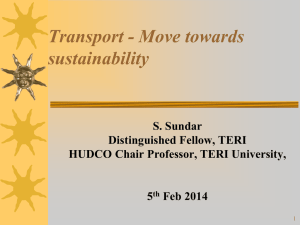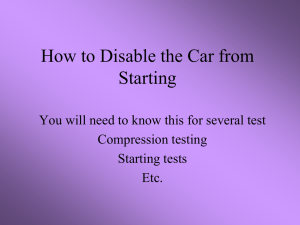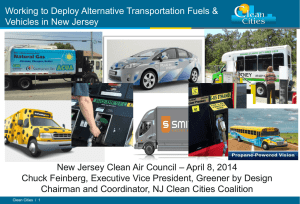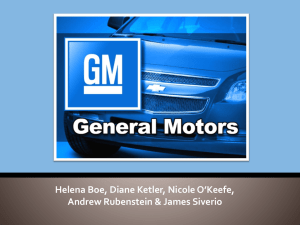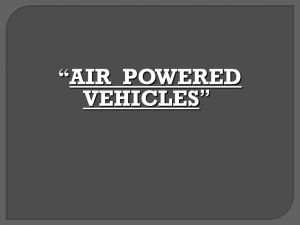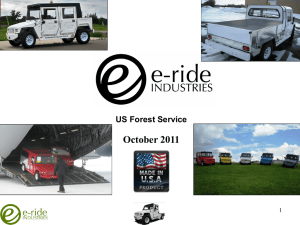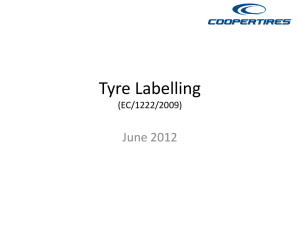Fixed costs
advertisement
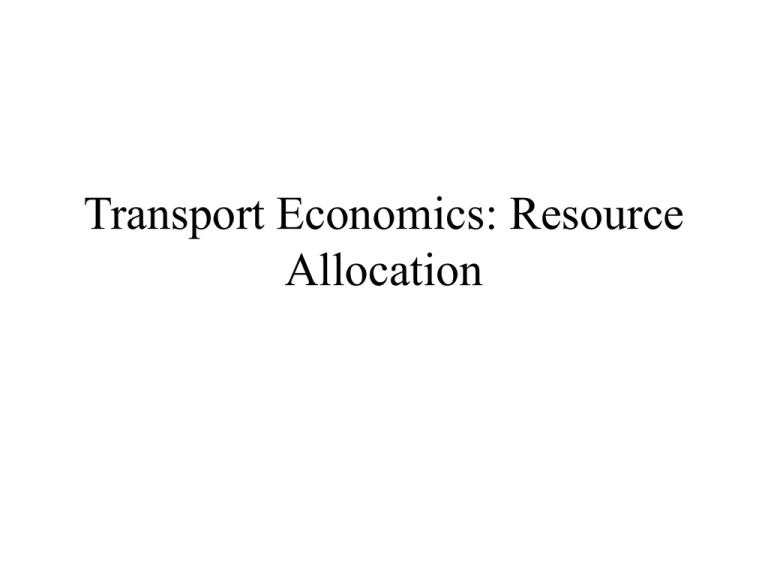
Transport Economics: Resource Allocation Costs In Transport • Three Types: • Private Costs • External Costs (externalities) • Social Costs =Private Costs + External Costs Efficient Resource Allocation In Transport • As we know efficient resource allocation in markets exists where MC = MR. • In the case of transport we can say that efficient resource allocation will exist at MSC = MSB. Efficient Resource Allocation In Transport MSC Cost/Benefit Optimum Optimumallocation allocation MSB quantity Efficient Resource Allocation In Transport • MSC Cost/Benefit Optimum allocation MPC However as we know in many markets this is not the case as private costs fail to reflect social costs of provision. MSB • Therefore the market does not allocate resources at the socially optimum point. • What, therefore are these costs? quantity Private Costs of Transport • These Fall into Two Categories: • Fixed costs: the costs of making transport vehicles available for use. • Variable costs: costs dependant on the way in which transport vehicles are used and the level of service available. Private Costs of Transport Mode of Transport Private Cars Heavy Goods vehicles Rail Air Sea Fixed Costs Variable Costs Private Costs of Transport Mode of Transport Fixed Costs Variable Costs Private Cars Capital costs, insurance, road tax, depreciation Fuel, Maintenance, Tyres Heavy Goods vehicles Rail Air Sea Private Costs of Transport Mode of Transport Fixed Costs Variable Costs Private Cars Capital costs, insurance, road tax, depreciation Fuel, Maintenance, Tyres Heavy Goods vehicles Capital costs, Licenses, insurance, depreciation, depot costs Fuel, maintenance, drivers wages Rail Air Sea Private Costs of Transport Mode of Transport Fixed Costs Variable Costs Private Cars Capital costs, insurance, road tax, depreciation Fuel, Maintenance, Tyres Heavy Goods vehicles Capital costs, Licenses, insurance, depreciation, depot costs Fuel, maintenance, drivers wages Rail Track costs, capital costs, interchange costs. Fuel, maintenance, labour costs Air Sea Private Costs of Transport Mode of Transport Fixed Costs Variable Costs Private Cars Capital costs, insurance, road tax, depreciation Fuel, Maintenance, Tyres Heavy Goods vehicles Capital costs, Licenses, insurance, depreciation, depot costs Fuel, maintenance, drivers wages Rail Track costs, capital costs, interchange costs. Fuel, maintenance, labour costs Air Capital costs, administrative and overhead charges. Fuel, maintenance, landing charges, in-flight services, labour costs Sea Private Costs of Transport Mode of Transport Fixed Costs Variable Costs Private Cars Capital costs, insurance, road tax, depreciation Fuel, Maintenance, Tyres Heavy Goods vehicles Capital costs, Licenses, insurance, depreciation, depot costs Fuel, maintenance, drivers wages Rail Track costs, capital costs, interchange costs. Fuel, maintenance, labour costs Air Capital costs, administrative and overhead charges. Fuel, maintenance, landing charges, in-flight services, labour costs Sea Capital costs, insurance, administration and overhead charges Fuel, maintenance, in-voyage costs, harbour costs. Private Costs of Transport • N.B. – the are marked differences between modes of transport in terms of the ratio of fixed to variable costs. • E.g. Railway operation incurs heavy fixed costs however once a track is open for use the average cost per train falls as the no. of trains using the line increases. The External Costs of Transport • Pollution: Climatic, Visual and Noise. • Community severance and Damage from Vehicles. • Accidents • Congestion External Costs of Transport • MSC In order to account for these external costs we implement an indirect tax of a,b,c in order to internalise these costs to the producer and the consumer. Cost/Benefit Optimum allocation MPC b c a MSB quantity Figures Track Costs Argument


